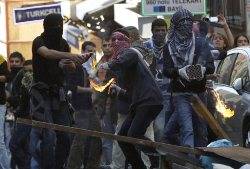Jailed Kurdish rebel leader Abdullah Ocalan is expected to issue a "historic" and long-awaited cease-fire declaration that would be a major step toward ending a 30-year conflict that has cost tens of thousands of lives in Turkey.
The expected ceasefire call on Thursday, which coincides with the Kurdish New Year, or Newroz, will take place in the Kurdish-majority city of Diyarbakir where hundreds of thousands will gather for celebrations.
The call would cap months of clandestine peace talks between Turkey's spy agency and the state's former public enemy number one Ocalan, who has been serving a life sentence for treason and separatism on Imrali island off Istanbul since 1999.
Prime Minister Recep Tayyip Erdogan and Ocalan both appear to have staked their political futures on the renewed push to end the 29-year armed campaign for self-rule that has killed some 40,000 people, mostly Kurds.
Erdogan said he was putting his faith in the peace process "even if it costs me my political career", in the face of accusations that Ankara was making concessions to Ocalan -- routinely labeled a "terrorist chief" and "baby-killer" by Turks.
Ocalan -- known as "Apo" -- has said he wants peace for the greater good of his people.
"Consider Apo dead if this process fails. I am simply out," the burly 64-year-old was quoted as saying in a rare prison meeting with Kurdish lawmakers last month.
Constitutional recognition
Ocalan's expected ceasefire is likely to be in return for wider constitutional recognition and language rights for Turkey's up to 15 million Kurds.
The peace plan is expected to be the result of written consultations between Ocalan, pro-Kurdish lawmakers and PKK bodies in Europe and northern Iraq, under the close monitoring of Turkish agents.
Kurdish lawmakers say Ocalan might ask for commissions to be established to properly monitor the ceasefire, and call for safe passage for fighters wishing to leave Turkey.
Erdogan has already vowed that no militant would be "touched if they leave the land".
But the rekindled peace process has not been without controversy.
Nationalist opposition leader Devlet Bahceli has accused Erdogan of "treason" and "selling out the country to a bunch of bloody bandits".
A test for Ocalan
The ceasefire will also be a test of Ocalan's influence over the PKK after years of being cut off from the outside world.
At least four previous ceasefire attempts called by Ocalan have stumbled over a lack of faith between the PKK and its arch enemy Ankara. With each failed ceasefire, the violence escalated.
Asked if the new peace process would be successful, Justice Minister Sadullah Ergin told reporters "there are no guarantees".
"But we know what is going to happen if it does not," he said.
In a sign of goodwill, the PKK last week freed eight Turkish prisoners it had been holding hostage for some two years.
The rebel movement wants to see the release of hundreds, if not thousands, of people detained on charges of links to the PKK.
Under Erdogan, in power since 2002, the Kurdish minority has been granted more language rights in recent years, including the establishment of a Kurdish-language television channel.
PHOTO CAPTION
Pro-Kurdish demonstrators clash with riot police in Istanbul in this May 16, 2011 file photograph.
Al-Jazeera


 Home
Home Discover Islam
Discover Islam Quran Recitations
Quran Recitations Lectures
Lectures
 Fatwa
Fatwa Articles
Articles Fiqh
Fiqh E-Books
E-Books Boys & Girls
Boys & Girls  Hajj Rulings
Hajj Rulings Hajj Fatwas
Hajj Fatwas














